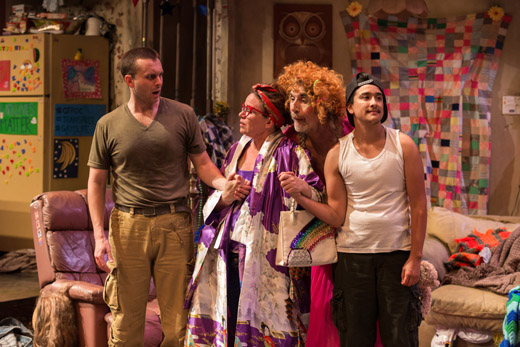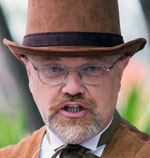
So God created humanity in his own image. In the image of God he created him: male and female he created them. (Gen 1:27)
By Eric George Tauber

SAN DIEGO — For most of us, gender distinction is pretty clear-cut and we live our lives accordingly. But for some, the picture is more complicated. And that’s the picture being painted at the Cygnet Theatre’s production of HIR.
Isaac comes home from his tour of duty expecting the house he remembers, but things have changed. What he finds is utter disarray and his father made up in an orange wig and a pink dress like a drunken drag clown.
“I’ve gotten a little eccentric, but I’m not insane.”
Deanna Driscoll is a frenetic powerhouse as Paige. Her husband, Arnie, was a violent, abusive, macho beast of a man. But now that a stroke has left him debilitated, it’s payback time. Hausfrau chores like cooking, cleaning and laundry are things she “doesn’t do anymore.”
And Isaac’s little sister Max is no longer his little sister. Ze is in transition, sporting a wisp of a moustache, combat boots and a manly pair of pecs.
A changing cultural landscape calls for changing language. In the trans-community, “ze” replaces the subject pronouns “he” or “she” and “hir” (pronounced like “here”) replaces the object pronouns “him” and “her.”
“I’m allowed to be selfish because I’m in transition.”
Avi Roque is brilliant as Max. Ze has a masculine body, but ze’s body language is still very feminine. And ze is terribly lonely for want of friends. Living in a small town, there’s no one like hir for a hundred miles. Ze has only found a semblance of community online and yearns to join a trans-queer anarchist commune where they live off the land, sell honey and rope sandals and throw themselves into wild orgies.
Dylan Seaton is our relatable everyman as Isaac. As a former Marine, he’s accustomed to structure and he makes it his mission to bring order to the chaos that has wracked his childhood home. And Joel Castellaw cuts a pathetic figure as Arnold. Once the angry abuser, he’s now an abused, neglected and humiliated shadow of a man. Paige isn’t wrong to say that he doesn’t deserve our pity. But not showing compassion darkens our souls and turns us into the very monsters we so despise.
Director Rob Lutfy consistently amazes me with his ability to bring us into a world that no one would want to live in. But once we’re there, we can’t bring ourselves to leave.
I stayed for the Wednesday evening talk-back with trans-reps from The Center in Hillcrest. They spoke of how exhausting it is to constantly explain themselves and correct the pronouns people use to refer to them.
“If your family doesn’t get you, what makes you think the world is going to get you?” -Deja
Trans people refer to their original names as their “dead” names and resent being called by them. Friends and family will mourn a transition as they would a death, feeling that they’ve lost their loved one. The person who has transitioned feels that they’ve gained a healthier, happier person.
Our own community wrestles with these issues. While progressive streams of Judaism are more open to change, Orthodox Judaism maintains a solid mechitzah separating the sexes. The Hebrew language even has different ways to ask, “How are you?” to men and women. And yet, prominent rabbis have encouraged compassion and even support of transitioning under the principle of Piku’ach Nefesh, the value of a soul. That is, if a person is so miserable living with hir’s birth gender, then ze should make the transition in order to live.
As a comfortably cis-gendered male, I’m thankful that I really don’t get where these people are coming from. But I am willing to listen. What a shondeh if I allowed my lack of compassion to darken my own soul.
L’Chaïm!
*
Tauber is a freelance writer specializing in coverage of the arts.He may be contacted via eric.tauber@sdjewishworld.com